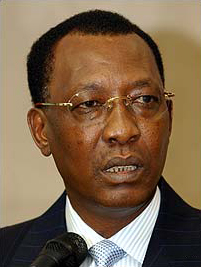Efforts made by the O.A.U to end the civil war in Chad.
The O.A.U gave moral support and backing to president Malloum when he called for a cease-fire in January 1977.
When Malloum proposed to hold peace talks with president Muamer Gadafi of Libya in 1978, the OAU gave him full backing,
When Malloum proposed to hold peace talks with president Muamer Gadafi of Libya in 1978, the OAU gave him full backing,
The OAU supported Malloum's efforts of creating a government of
national unity. This was formed in August 1978 by appointing Habre
Hissene as Prime Minister and appointing ministers from all regions of
Chad.
The OAU in conjunction with the UNO organised the Kano peace talks in
1979 during which an agreement was reached to form a new council of
state . It was to be headed by Goukouni as president of Chad and Habre
as minister of defence.
During the 1981 OAU summit, the question of the civil war in Chad was
tabled and seriously discussed. The OAU Member State strongly condemned
Libya's support to the FROLINAT and demanded Gadafi to withdraw his
troops from Chad or else face sanctions.
In November and December 1981, the OAU sent 3000 troops to help keep peace in Chad. They were financially supported by president Mitterand of France.
In November and December 1981, the OAU sent 3000 troops to help keep peace in Chad. They were financially supported by president Mitterand of France.
In February 1982 the OAU convened an emergence meeting of 18 nations in
Nairobi to discuss the situation in Chad. A standing committee was
created and charged with the responsibility of drafting a new
constitution which would represent all the national interests of
Chadians.
The OAU mobilized £270,000 to finance the operations of the peace keeping force in Chad.
The OAU's committee on arbitration, conciliation and mediation tried
its level best to put an end to the Chadian civil war through
diplomatic means.
The presence of the OAU peace keeping forces helped to reduce the number of casualties in the Chadian civil war.
In April 1989 an unsuccessful coup attempt was led by the interior
minister, Brahim Mahamot Itno, and two key military advisers, Hassan
Djamouss and Idriss Déby. Itno was arrested and Djamouss was killed,
but Déby escaped and began new attacks a year later. By late 1990 his
Movement for Chadian National Salvation forces had captured Abéché, and
Habré fled to Cameroon.
 Déby suspended the constitution and formed a
new government with himself as president. Although it was reported that
he had received arms from Libya, he denied Libyan involvement and
promised to establish a multiparty democracy in Chad.
Déby suspended the constitution and formed a
new government with himself as president. Although it was reported that
he had received arms from Libya, he denied Libyan involvement and
promised to establish a multiparty democracy in Chad.
A national conference was held in 1993 to establish a transitional
government, and Déby was officially designated interim president. In
1996 a new constitution was approved and Déby was elected president in
the first multiparty presidential elections held in Chad's history.
Peace was still fragile, however, and periodic skirmishes with
opposition groups developed into a full rebellion in late 1998 when the
Mouvement pour la Démocratie et la Justice au Tchad (MDJT) began an
offensive in the northern part of the country. Other opposition groups
later joined forces with the MDJT, and the rebellion continued into the
21st century.
In 2001 Déby was reelected amid allegations of fraud by his opponents;
however, international observers found the electoral proceedings
largely to be valid. Meanwhile, Déby's government was still coping with
major rebel offensives, until peace accords in 2002 and 2003
essentially ended most of the fighting.
Also in 2003, years of planning
and construction came to fruition when Chad became an oil-producing
country; the revenues generated from this undertaking had the potential
to transform the country's economic situation. Despite the progress
Déby's government made with promoting peace and creating an opportunity
for economic prosperity, there was another coup attempt in early 2004.
National Movements and New States in Africa